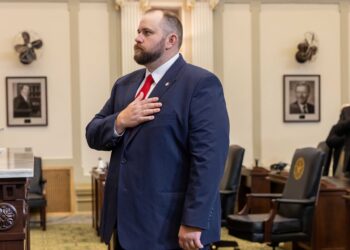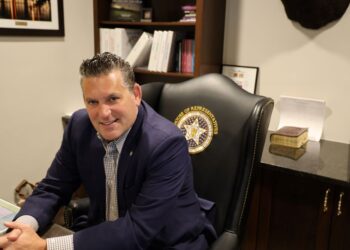OKLAHOMA CITY (OBV) – Oklahoma State Sen. Kristen Thompson filed a bill to create a state government agency that she says will be solely dedicated to revolutionizing economic development and recruiting and retaining businesses in the state.

Senate Bill 1447, written by Thompson, creates the Oklahoma Office of Economic Development, Growth and Expansion (OkEDGE). A complimentary bill, SB 1448, will create a multimillion-dollar fund for OkEDGE’s economic development efforts.
“Basically, we’re pulling out the existing functions of business development and business retention and expansion that currently exist in the Department of Commerce and making it its own independent office. It will function like a state agency,” Thompson said during an interview conducted by Oklahoma Business Voice.
OkEDGE would be located in the Department of Commerce facility and comprised of Commerce employees.
A division within the Commerce Department currently manages business and economic development.
“We’re really just moving business development, business retention, expansion out of Commerce and making it a standalone agency so we can really have a champion for those efforts in Oklahoma,” Thompson said.
Thompson’s plan includes a nine-member board of directors that will govern OkEDGE. The governor, Senate pro tem and House speaker will each make appointments to the board. The board will hire a CEO to manage OkEDGE operations.
The proposal includes a one-time investment of $698 million into an economic development fund. Thompson said projections show that interest from the investment will produce an 8 percent return on investment, which amounts to an annual allocation of $55.84 million specifically designated for economic development, business retention and expansion efforts.
Thompson said $698 million is the figure Panasonic requested from the state last year during negotiations to compel the company to build a factory in Oklahoma. The Oklahoma Legislature approved the amount requested by Panasonic, but the technology company chose to not build a factory in Oklahoma.
“The legislature already said they were willing to give that money to a new business. I felt like that was an appropriate number to ask for,” Thompson said.
Tesla and Volkswagen also considered Oklahoma as a potential location for a plant. However, like Panasonic, both companies chose not to build a plant in the Sooner State.
Following the state’s failure to attract those businesses, Senate Pro Tem Greg Treat formed a select committee that was tasked with looking at economic development, growth, business expansion and business retention in the state.
“He formed that committee to figure out why we were losing out on these big opportunities, and then also to take a deep dive at our existing businesses and [ask], ‘What are we doing that’s not working? What are we doing that is doing well,'” Thompson said.
Conversations with Oklahoma’s business community led to the idea for OkEDGE.
“I’ve been in constant contact with folks all across the state who are working in the economic development space. I’ve been in contact with the governor’s office and our House counterparts, and really just working together as a team to figure out the best model moving forward for the state to do business better,” she said.
It was determined that a focused entity was needed to handle economic development and business retention.
Thompson said Lt. Gov. Matt Pinnell was especially supportive of the efforts and planning that went into OkEDGE.
Virginia, Ohio, Utah, Georgia and Indiana have similar agencies that are dedicated to economic development and business retention, and OkEDGE will be modeled after the best aspects of those entities, Thompson said.
“I’m a big believer that we can gain a lot of wisdom by asking questions and seeing what has worked and what hasn’t worked for other states,” she said.
OkEDGE will be Oklahoma’s lead negotiation arm, working to attract new businesses while ensuring the satisfaction and retention of current companies.
Thompson said that OkEDGE will collaborate with other state agencies and entities dedicated to business retention and recruitment, such as the recently-formed Oklahoma Workforce Commission.
“This is really going to be focused on growing what we have now as well as recruitment, making sure that our businesses that have chosen to be here know what’s available to them so they can grow and expand,” she said.

















